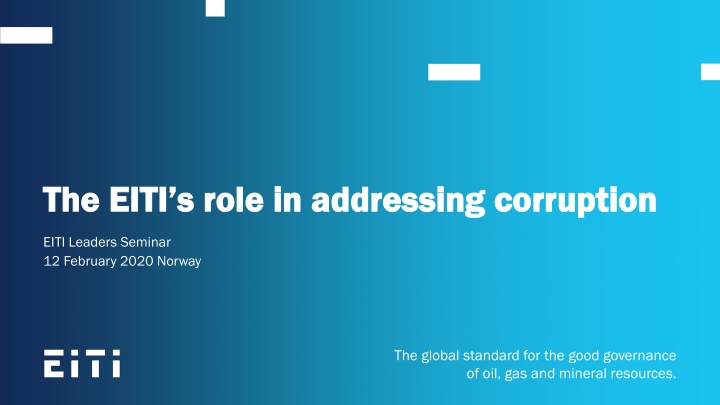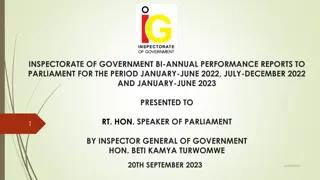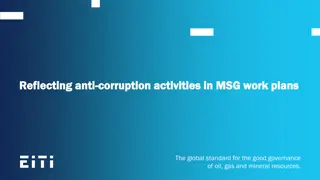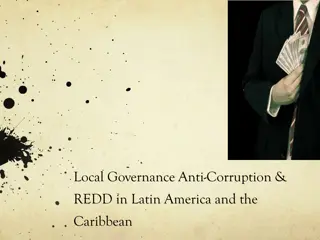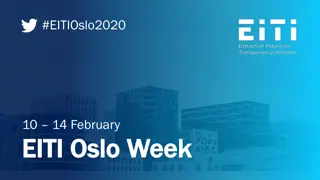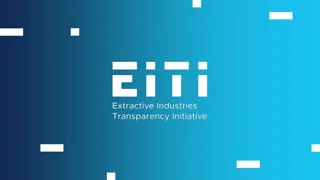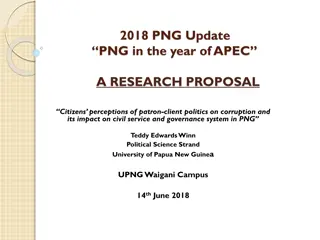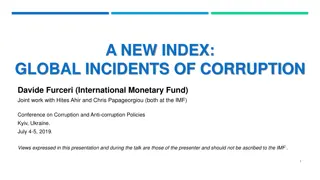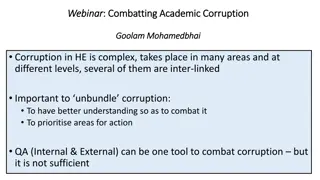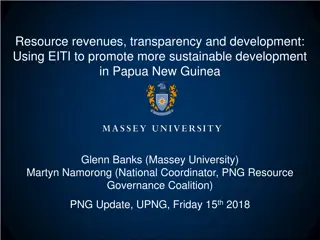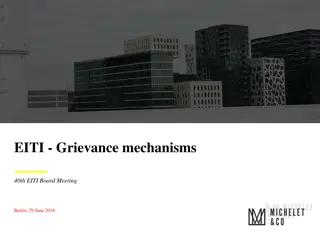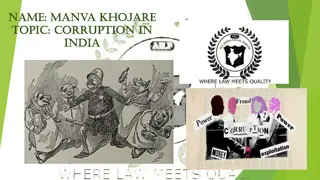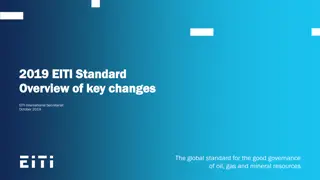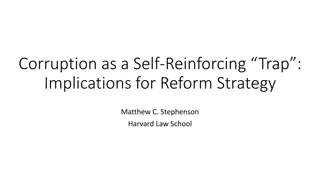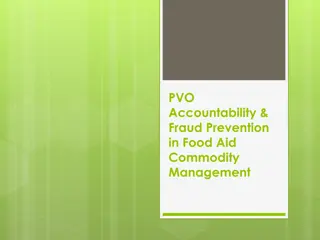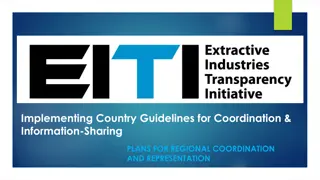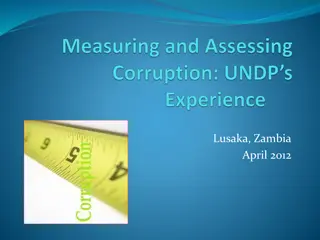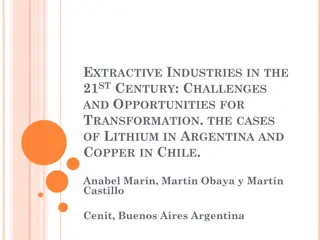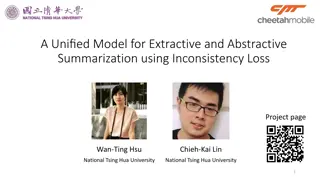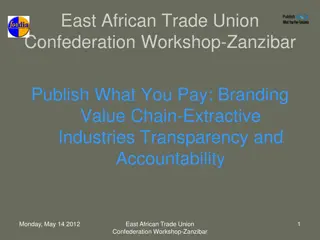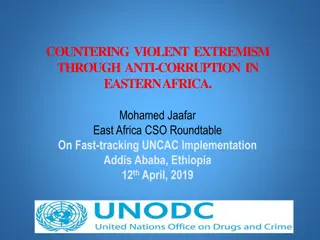Role of EITI in Addressing Corruption in Extractive Sector
The Extractive Industries Transparency Initiative (EITI) plays a crucial role in combating corruption within the extractive sector by exposing corrupt practices, providing valuable information, supporting citizen engagement, and advancing global anti-corruption norms and policies. Through transparency and accountability measures, EITI aims to deter corrupt behaviors and promote good governance in the management of natural resources.
Download Presentation

Please find below an Image/Link to download the presentation.
The content on the website is provided AS IS for your information and personal use only. It may not be sold, licensed, or shared on other websites without obtaining consent from the author.If you encounter any issues during the download, it is possible that the publisher has removed the file from their server.
You are allowed to download the files provided on this website for personal or commercial use, subject to the condition that they are used lawfully. All files are the property of their respective owners.
The content on the website is provided AS IS for your information and personal use only. It may not be sold, licensed, or shared on other websites without obtaining consent from the author.
E N D
Presentation Transcript
The The EITI s EITI s role role in in addressing addressing corruption corruption EITI Leaders Seminar 12 February 2020 Norway The global standard for the good governance of oil, gas and mineral resources.
Corruption Corruption Risks in Risks in the the Extractive Extractive Sector Sector Panama Papers Panama Papers Unaoil Unaoil Leaks Car Car- -Wash Wash Scandal Malaysian Malaysian 1MDB Scandal Scandal Suspicious Suspicious behavior by by companies companies and individuals individuals behavior and Leaks Scandal 1MDB Investigation Investigation and prosecution prosecution related to to corruption corruption charges charges and related Some Some Extractive Extractive Companies Companies
Prevalence Prevalence of of Corruption Corruption in in Extractive Extractive Sector Sector FCPA FCPA enforcement enforcement actions actions Extractive sector Extractive sector 20% 20% About About 50 50 actions actions out out of of 242 242 OECD Report OECD Report on on Foreign Foreign Bribery Bribery About 85 85 actions actions out About out of of 427 427
How How does does the EITI the EITI help help address address corruption corruption? ? Exposing Exposing practices Examples: highly discretionary license award processes, off-budget revenues, license holders that do not pay taxes, gaps in legal and regulatory frameworks, questionable revenue expenditures. practices in in natural natural resource resource governance governance that that are are vulnerable to vulnerable to abuse abuse Exposing Exposing suspicious Examples: licenses awarded to unqualified recipients, comparison of production data vis-a- vis tax payments, SOE investigations. suspicious deals deals and and transactions transactions Providing Providing valuable Fiscal regimes, contractual stipulations, commodity trading valuable contextual contextual information information
How How does does the EITI the EITI help help address address corruption corruption? ? Supporting citizens discussion, monitoring and advocacy Supporting citizens discussion, monitoring and advocacy Examples: MSGs follow up on findings of discrepancies or policy recommendations, facilitate multi-stakehodler dialogue Advancing Advancing global norms and policies related to anti global norms and policies related to anti- -corruption Examples: beneficial ownership, SOE transparency, commodity trading, contract transparency corruption Deterring corrupt behavior through transparency Deterring corrupt behavior through transparency
Shining Shining a a light The EITI requires disclosure in many of the areas most prone to corruption risk The EITI requires disclosure in many of the areas most prone to corruption risk light in the right in the right places places Beneficial Beneficial Ownership Ownership SOEs SOEs Contracts Contracts Licenses & License Licenses & License Allocation Allocation The mandates on revenue retention and spending (Reqs. 2.6, 4.5 & 6.2). This is relevant since usually operate apart from government oversight systems. EITI Standard disclosures Since 2013, EITI has encouraged contract Now the EITI Standard (Req. 2.4) disclosure of new or amended from 2021 onwards. more BO data required by the EITI Standard (Req. 2.5) can be used to assess inappropriate individuals licenses, (e.g. PEPs, people with conflict of interest, etc.). EITI Standard (Req. 2.2 & 2.3) helps lack of transparency and clarity in proceses, and absence of up to date or accurate license registers disclosure. addressing quasi-fiscal requires whether allocation SOEs contracts hold standard
Shining Shining a a light The EITI requires disclosure in many of the areas most prone to corruption risk The EITI requires disclosure in many of the areas most prone to corruption risk light in the right in the right places places Other Other topics Areas of high corruption risks: production data (3.2), infrastructure provision arrangements transportation revenues (4.4), distribution of extractive revenues (5.1), revenue management (5.3) and social expenditures (6.1).. topics First Trades First Trades Payment Payment Flows Revenue Collection Revenue Collection Flows & & Subnational Subnational Payments Payments Data on commodities sale, (Req. 4.2) can help stakeholders identified abuses: selection unqualified price manipulation, etc. Reporting on extractive revenues received by regional and governments (Req. 4.6) can prompt scrutiny and identify whether the transfer, management or use of the funds corruption risks. The data related to Req. 4, allows for questions about unusual payments, or payments routed to a recipient agency where scrutiny is limited or in a manner that violates the law. & barter (4.3), possible bribery, local of greater buyers, industry face
Examples Examples Questions Questions? ?
AUTHOR AUTHOR Gay Ordenes & Catherine Greene DATE DATE 10 February 2020 OCCASION OCCASIONImplementing countries consultation meeting , Oslo, Norway E E- -MAIL MAILsecretariat@eiti.org PHONE PHONE +47 22 20 08 00 www.eiti.org @EITIorg ADDRESS ADDRESSEITI International Secretariat, R dhusgata 26, 0151 Oslo, Norway
